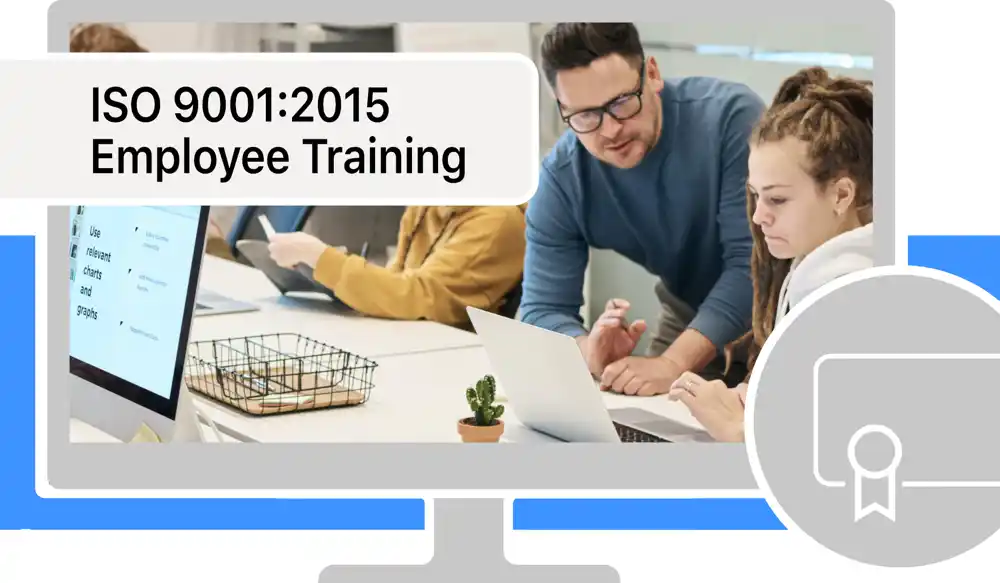Skipping the ISO 9001 Employee Training
2 November 2023
It has been done. And it is a really bad idea. Let us show you how a short introduction to ISO 9001 makes a significant difference when it comes to the implementation of the quality management system, productivity, audits and overall success of the company.

The Importance of ISO 9001 Employee Training
Introductory ISO 9001 staff training is important for several reasons:
Compliance: Employee training is essential for organizations to comply with the ISO 9001 standard. The standard requires that all employees who affect the quality of the organization's products or services (many auditors argue that this means everybody) be trained on the standard and are aware of the quality policy, quality objectives, and their role in achieving them.
Engagement: Providing employee training on ISO 9001 typically results in improved employee engagement and motivation, increases staff participation in quality management, ultimately leading to better business performance.
Improved quality: ISO 9001 helps organizations to focus on quality, and when employees understand the principles and requirements of the standard, they can contribute to the organization's efforts to improve quality.
Customer satisfaction: ISO 9001 is focused on meeting customer needs and expectations. When employees are trained on the requirements of the standard, they are better equipped to understand customer needs and deliver products and services that meet those needs, improving customer satisfaction.
Consistency: When all employees are trained on ISO 9001, they are better equipped to understand the standard's principles and requirements. This ensures that all employees work in a consistent and standardized manner, reducing variability in outputs and improving the quality of the organization's products or services.
Continuous improvement: ISO 9001 is focused on continuous improvement, and employee training is a key component of this process. When employees are trained on the standard, they are better equipped to identify opportunities for improvement and contribute to the organization's efforts to continually improve its quality management system.
In summary, ISO 9001 employee training is essential for organizations to comply with the standard, engage employees in the quality management process, improve quality, customer satisfaction and consistency, and build a culture of quality and continuous improvement. All these aspects contribute to improved business performance.
Focus on Engagement
Engaging employees in ISO 9001 through training is critical to the success of the quality management system. Employee engagement is the foundation. If your employees buy into ISO 9001 and are eager to take part, the other benefits and improvements will follow. Here are some strategies to help engage employees in ISO 9001 through training.
1. Make it relevant: Ensure that the training is tailored to the employees' roles and responsibilities, and show them how their work contributes to the quality management system. This relevance can help employees see the value of the training and understand how they can apply what they learn in their work.
2. Use interactive methods: Interactive training methods, such as group activities, case studies, and interactive online training, can help engage employees in the learning process. These methods can also help employees apply what they learn to real-life situations, which can increase their understanding and retention of the material.
3. Demonstrate the benefits: Highlight the benefits of ISO 9001, such as improved quality, increased customer satisfaction, higher job satisfaction, and more efficient processes. This demonstration can help employees understand why ISO 9001 is important and motivate them to participate in the quality management system.
4. Provide ongoing training: ISO 9001 training should not be a one-time event. Providing ongoing training can help reinforce the principles and requirements of ISO 9001 and keep employees engaged in the quality management system.
Timing is Important
Whenever an organization decides to adopt the standard, it is important to provide training to all employees – not only those who will be directly involved in implementing and maintaining the quality management system. Early staff training prevents misunderstanding, gossip and a negative attitude towards ISO. On the contrary, a good course creates buy-in and motivation to participate.
New hires should be introduced to ISO 9001 as early as possible, ideally during their onboarding process. This will ensure that they are aware of the organization's commitment to quality management and understand how their work contributes to the organization's goals.
Additionally, it is recommended that employees receive ongoing training on the standard to ensure that they remain knowledgeable and up-to-date on any changes or updates to the standard. This will help to maintain a culture of continuous improvement and ensure that all employees are contributing to the organization's efforts to meet customer needs and improve business performance.
Conclusion
Overall, it is important to provide introductory ISO 9001 training to all employees in the organization regardless of their position and level of involvement in the quality management system. If you are planning to get your organization ISO 9001 certified, provide your staff with an ISO 9001 overview as early as possible and before rumors and bad feelings develop. A good ISO 9001 employee introduction can make a huge difference to the success of your quality system and, thus, the performance of your company.


